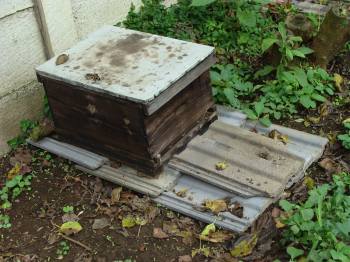- Bernard Preston homepage
- Beekeeping
How to start beekeeping
How to start beekeeping is the best of my many hobbies; finer than gliding, more rewarding and satisfying than trout fishing and carpentry.
Little did my grandfather realise it when he taught me how to start beekeeping that it would become so prominent in my life. Though hard-pressed to admit it, I find these little stinging insects more satisfying than virtually all my other endeavours; they are central to our understanding of permaculture.
I have many hobbies, but only one has really stood the test of time; raising bees. Backyard 'keeping has been a passion for over half a century; since my grandfather, a great apiarist, gave me my first hive when I was eleven-years old.
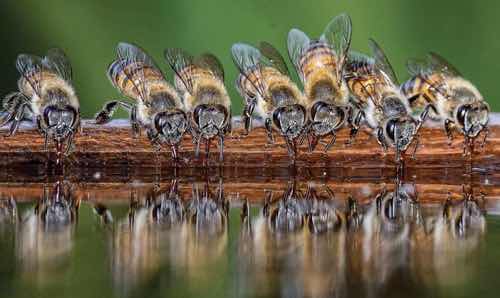
This page was last updated by Bernard Preston on 1st May, 2023.
Reviewed by Derek A. Lewis, beekeeper.
For two periods of my life I have had to go without my African honey bees but, for the rest, I have always had a few hives around. Then in 2010 it was back to square-one with only a single box brought in from the traps that week. Those two periods of dearth were during four years studying in Chicago and another seven practising in the Netherlands.
It is
now eleven-years later and I am happy to report in this column on how to
start beekeeping that I am up to thirteen hives and that is enough. Two actually are very small and I will unite them; tiny colonies produce no surplus honey. More about that later.
"If a man does not keep pace with his companions, perhaps it is because he hears a different drummer. Let him step to the music which he hears, however measured or far away."
Henry David Thoreau
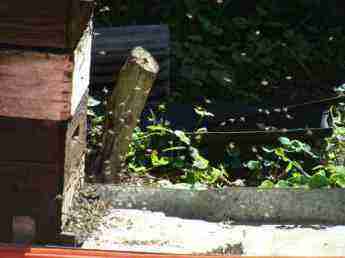
Don't mess with African honeybees; they are dangerous.
Honeybee farming
Honey farming is where I could just as easily have made my mark in life, but it wasn't to be. Not to detract from how to start beekeeping but care of the human frame proved even more interesting.
Gliding is on hold for the moment; I still have not unpacked my carpentry-tools after the long sojourn in Holland, I haven't yet bought another motorcycle but I have now acquired my first honeybee hive. It does not look like much but just you wait, Henry Higgins.
Here is an update at how to start beekeeping; that busy hive above comes from two small colonies that I have united. We will get on to the details of how to do that later, but it is now four-weeks since the initial swarm moved in; and the first young workers have hatched. By adding another colony you immediately greatly strengthen the workforce; the queens fight it out.
The front of the box is very busy as you can see; newly-hatched bees are getting acclimatized with the environment, making their first solo flights, and the workers are gathering in the harvest. Only unite two colonies during a honeyflow.
Before deciding to become a DC, several times I considered honeybee farming. Why, you may well ask?
Well how many jobs are there where you have to work really hard for about six-months; and then have the rest of the year off to do your own thing? Makes you think, eh?
The set up costs are relatively low. An unassembled beehive in South Africa, bought from the local supplier is less than R1500, or eighty dollars. Now a very strong colony will produce up to 100 pounds of honey per year. At ninety rand per bottle, that comes to a stunning 9000 rand; a five-fold increase on your investment.
That is not a bad return, huh but not every hive will produce 100 bottles of honey; you can bank on an average of around 40 or 50 pounds per year.
One harvests four or five times a year; yesterday I robbed 40 pounds from three hives. In total that would amount to perhaps 200 bottles annually. You can pay off the setup costs very quickly.
Then I had to do something about my apiary. The jungle again reigned supreme after our seven-years in the Netherlands. This was once the site of 24 hives.
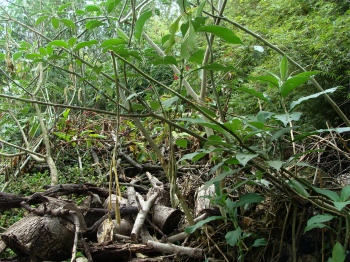
These logs from a tree that fell down in our absence will make excellent humus; they are already half rotten. A compact tumbler is another option. We are creating here a Cyan Zone; a combination of green and blue issues. Good for the planet and healthy for us.
The Blue Zones of the world are known for their longevity; being busy and active at ninety is the norm.
If you are going to keep them in your own garden then consider whether it is possible to plant indigenous trees for bees. Whilst every keeper loves Eucalypts, they are not at home in Africa. Others like Halleria Lucida flower sooner; and also produce prodigious amounts of nectar for insect and bird alike.
Backyard beekeeping
Backyard keeping is for all if you have tame Italian bees; our African-killers are another story. They must be treated with great respect
Mostly you are probably thinking however of half a dozen hives in your backyard. Whether it's the life cycle of the bee, simply unprocessed and assuredly unadulterated honey for the table or some very nice pocket money a few colonies in the garden make for a wonderful hobby.
You will be filled with wonder; yes, I mean it. Does 400 bottles of the very best honey every year not sound good?
Or just something fascinating to get the kids away from the TV may be your motivation. Here you will find out how to start beekeeping.
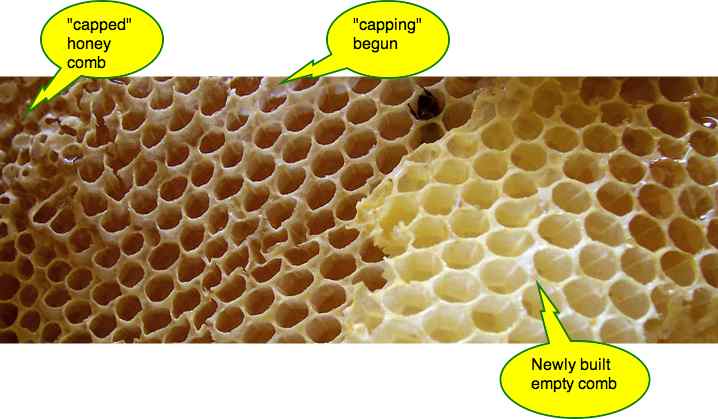
"Beekeeping is a profound source of enrichment and inner renewal."
- Bernard Preston
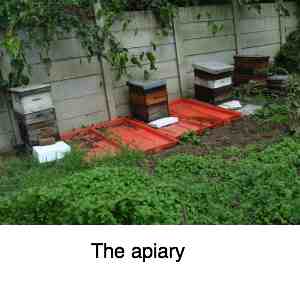
The apiary
The apiary is where you will keep your hives; it is an old-fashioned word, not much in use any more.
Computer studies have found that there is no stronger structure, for the amount of wax used, for building honeycomb than the hexagonal-cell,; they are offset against those on the other side.
So strong that the configuration is used in building jet-fighter wings. We have been fearfully and wonderfully made; and our honeybee too.
The first requirement is a warm and protected spot for your apiary. You will notice that my hives are up against a concrete wall to keep them, and the workforce from strong winds. Honeybee colonies should be oriented for maximum sunlight.
Early to bed and to rise will make you
healthy, wealthy and wise. See how bright my eyes are? Few foods beat raw, unprocessed honey for taste and wellness. Astonishingly reasearchs have found that it has a low glycemic index; it even lowers the blood glucose of diabetics. But everything changes once the commercial bottles mess with it.
An average beehive should produce between twenty and fifty-bottles of honey per year; seventy and more if you are a good keeper and they have access to plenty of nectar.
You can do the mathematics and figure out what the gross income on say two-thousand colonies would be; it's a good business to be in.
The apiary should also be protected from the neighbours; and your own home. You cannot see it but there is a thicket of bamboos between the bees and our nearest friends; we live on the other side of that concrete-wall.
In case you are concerned about a few weeds around the hives, bees are able to cope with incredible circumstances.
I have had to again go through the process of how to start beekeeping, and you can join me as I rediscovered their world. Like cats, you can never tame them; they remain dangerous, wild animals. Magnificent creatures if you can manage and persuade them to work for you.
It takes five or six bees to collect about a teaspoon of honey during their lifetimes; nearly a gram each.
I will be adding pages at how to start beekeeping; what you will need, the cost thereof and how to assemble the hives. How to trap swarms is important too. Watch this space. The basic equipment is really not very expensive, in relation to the return.
If you want to increase to more than five-hives then you will need an electric extractor eventually; but the honey will provide for it. This is a hobby that pays its way.
Plant indigenous trees for bees in your area if you are able; or even citrus and avocados. I was surprised to hear from a friend that he is germinating Halleria Lucida seeds, and sticking them in the ground near his home wherever possible.
There are several modus operandi for harvesting honey that you could follow.
How to start beekeeping
How to start beekeeping starts with an old, and preferably used hive; it should smell of bees and honey, not paint and synthetic-waxes.
Watch the news media and you will often find someone selling hives, or even giving them away; it's probably the best way to start beekeeping, so there is immediate reward for your enthusiasm.
I would not recommend you start beekeeping by getting a swarm out of a tree stump or roof; it is difficult and dangerous and often they will abscond leaving you despondent.
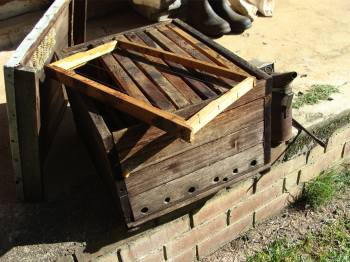
At my beekeeping equipment page you should find out about the other stuff you will need; like a veil and gloves, and an extractor and bottling tank.
Spend an hour reading all these links and you'll have a pretty shrewd idea of what it is all about, and what will you will need to start beekeeping.
Honey bee traps
Honey bee traps are an easy way to start beekeeping in a land where there are indigenous, feral colonies.
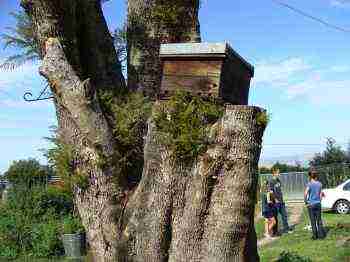
An apiary needs bees! Making good traps saves the cost of buying colonies. They need to be placed about two metres above the ground for optimal results.
An old tank stand, less than two feet above the ground has proved the best place for me to place my honey bee traps to attract a colony.
For another slant have a look at swarming bee traps.
Waxing honeybee frames is something that needs to be learned. It is not difficult, but a bit fiddly.
First you need the raw wax and that's best obtained using a beeswax solar extractor; it's not difficult to make.
Beekeeping courses
Many local associations hold free beekeeping courses for their members. They are a mine of information, and not just for the beginner. One always seems to learn something new.
So even before buying your first hive, join the local association. Most will have each year at least one beginners' beekeeping day.
Start a beekeeping journal right from the start; all your interventions, costs and of course your honey produced and sales.
This is my beekeeping journal for 2019.
Hiving a colony so that it does not abscond is an important topic.
RAW HONEY
Raw honey, lightly filtered, is quite different to what you may be used to.
Only small beekeepers, and their special friends are privileged to enjoy truly raw honey; it is worlds apart from the supermarket stuff. One factor is the debate over hot knife vs fork honey decapping.
There's a heat-labile enzyme in raw honey that makes it special for treating varicose ulcers and burns, and diarrhoea in babes; and your own digestion.
"Varicose veins and herbs" mixed with raw honey will sterilise an ulcer. Use the Site Search tab in the main menu above for more information.
"Unexplained infertility" at Bee under the Mitre ... a short story for those who love to read; again use the Site Search tab.
All supermarket honey is heated and strained through many filters; it ruins it, turning it into a processed food; like the difference between cake flour and 100% wholemeal; chalk and cheese. If you really want to enjoy the genuine product then consider how to start beekeeping.
Consuming quite large amounts of natural honey actually helps with weight loss and normalising lipid profiles, but it has one big negative; the long term measure of glucose in the blood is raised. The subjects in the research were taking 10 - 25 teaspoons per day. We recommend no more than five.
Crystallised, set and creamed honey is an important subject to understand; it helps one to distinguish between that which is entirely natural, though not organic which does not exist except in very rare apiaryies, and the adulterated stuff which is so common these days on supermarket shelves.
Feeding kept bees
Keeping bees is a lot of fun, with some danger to yourself and your neighbours and pets. A well fed colony is likely to become vicious.
Feeding kept bees with a sugar syrup is a subject easily misunderstood. The purpose is definitely not to adulterate the honey, but to prepare them for an anticipated flowering that is known to produce a surplus for you.
Another practice is delayed mowing allowing pastures to flower first.
Pollen for the prostate gland
Numerous studies have shown the beneficial effect of pollen for the prostate; an enlarged gland is one of the most awful conditions to afflict a male. It is a very complex subject, more of which you can read at those links above.
If you know about how to start beekeeping, then you can ensure that every day you are able to enjoy small quantities of pollen for your "prostate gland wellness." Use that Site Search tab for more information.
Tomatoes and the prostate gland too is an important subject for every man.
In short, to prevent malignant disease and engorgement of your prostate, you need a tomato a day, regular enjoyment of avocados and plenty of natural, unfiltered honey rich in pollen; pumpkin seeds with their high zinc content have been shown to help too.
We have a fetish for things pure, but nature does not make them that way. In my early days of beekeeping, I widely proclaimed that I produced only flawless honey; all tiny particles were filtered out through seven layers of muslin cloth.
But today, I filter it very lightly to remove any dead bees and, of course, debris but no more. The intention is that our natural, raw honey should contain as much pollen as possible. It is good for your allergies and does help with prevention for that nasty prostate affliction but it is less pure; intentionally so.
Pay a lot of money for prostate supplements if you must; alternatively you can enjoy your own lightly filtered honey loaded with pollen.
I put both pollen-rich honey and pumpkin seeds into our bread for my own prostate gland.
So, you see that how to start beekeeping is not just a fetish; it is about wellness too.
That pollen will also help the liquid set when you are making creamed clover honey, or whatever plants your bees are sourcing.
Prostate supplement
Prostate supplements certainly have some proven value. For myself, as a beekeeper, I am happy to enjoy honey which is lightly filtered and rich in natural pollen.
Nearing 70, I have zero urinary problems, with a PSA below 1.0, not just because of the pollen, but because I zealously enjoy a tomato a day; it is proven to reduce prostate cancer by fifty percent. A diet rich in phytochemicals and knowledge of how to start beekeeping have far-ranging benefits for our wellness.
We have three avocado trees planted in our garden for the beta-sitosterol; it is a phytosterol that helps prevent BPH. Do you have a swollen and inflamed gland; can you pee normally?
How many times to you get up at night?
"What are phytosterols?" Use that Site Search tab.
Whilst little research has been done it can be safely assumed that many of the important phytonutrients like the L-dopa in fava beans are also found in the pollen; just another reason to purchase only honey that has been lightly filtered.
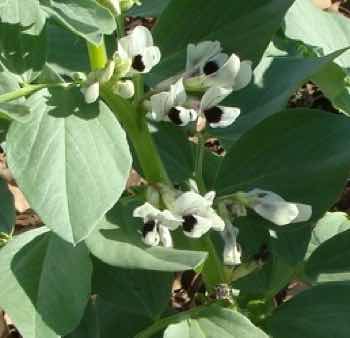
What about the honey bee life cycle? Apologies, but for the moment this page probably reads like the desultory mess that it is.
Establishing an apiary and the virtues of nectar are vast subjects and that will have to wait for a bit; but that is no reason for you not to find out how to start beekeeping.
I have already alluded to the fact that the first young bees have hatched in my new colony. One of the first tasks that the queen of the new hive must accomplish is to lay as many eggs as possible, as quickly as her workers can provide brood cells for her. Twenty-one days later they will emerge, and the future of the colony is assured.
It is a trade off. The beekeeper provides them with the perfect home; it must be dry and secure. But like the Mafia he demands payment; their produce during the honey flow belongs to me. If I take too much, they will die of starvation, and there will be none next year. The best is that if I look after their interests, they look after mine
Those hives in the apiary incidentally must be in full sun. Yesterday I was astonished when a friend from our soaring society wanted to buy my raw honey; he has nine hives, he tells me. But they are buried deep in a forest and produce no surplus for him; he is not up on how to start beekeeping.
We are looking at how to move them nearer his home, but it is only a third of a mile away. So, we'll move eight of the hives to his new apiary, leaving the weakest colony behind to collect any stragglers that return to the old forest site. You can only do that during a honey flow, by the way. Otherwise you will have the possibility of a bee war on your hands.
How to start beekeeping is fascinating.
Why does honey crystallise?
Why does honey crystallise may help you dispel some misconceptions. Beginning with how to start beekeeping there will be many things that puzzle you.
There is vast misunderstanding about bees in the general public. Just type why does honey crystallise into Google and you will be astonished how many people think that because the nectar has solidified it must have gone off and should be thrown away.
Crystallisation of honey is an entirely natural process and, if it does not go solid, then it's probably been heated or adulterated, with some exceptions.
Most top-rate honeys will solidify, forming fine, uniform crystals. Actually it is the sign of a good product.
Is it about our little friends or the honey? Either way, if you want to get your kids away from that boring box, how to start beekeeping is worth a thought. Like all things new, it is important to talk to the locals and do as much reading as possible before making a start.
That was a silly question really; it's about both honey and bees for most of us. But there are legitimate questions about just how good it is. Does it have a high glycemic index?
Is it fattening? Does it stress the pancreas by producing a dramatic surge in the blood sugar? These are all good questions. Read more on the subject at honey glycemic index.
Once you consider how to start beekeeping, you will find it leads you down any number of fascinating subjects; what pollen does for your wellbeing and some deeper understanding of the simple vs complex carbohydrate debate. They can both be good or bad, and a love of the outdoor life for you and your family certainly helps with insulin resistance. Let us turn off the damn telly and get the kids off their smart phones.
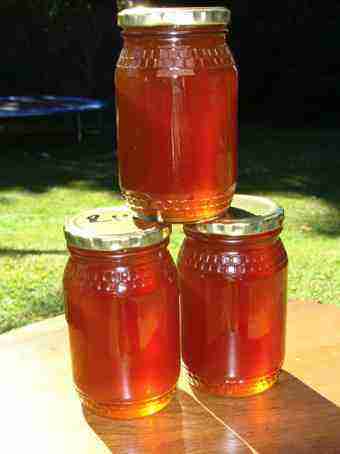
This is fresh lightly-filtered, raw honey from the hive; it will crystallise in a few weeks. I cream most of it actually.
So I hope that you've been inspired and the subject of how to start beekeeping will soon be a regular discussion at your dinner table.
Queen breeding
All the research suggests that queen breeding makes a huge difference to the strength of the colony and the amount of honey harvested. By mating with one or perhaps a few of the most resilient of the drones from all the neighbouring hives, she is a perfect example of Darwin's theory of natural selection.
Bee-eating birds can take the young queen on her virginal flight.
Choice foods
Choice foods are what give you a real chance of reaching a happy, vibrant eighty with all your marbles and joints intact. I am unconvinced
that the stuff you buy in the supermarket qualifies, but I know that the
raw honey you will be enjoying once you know how to start beekeeping will
bear fruit; it is a wonderful product, eaten in moderation.
Whilst I am skeptical about the highly refined and often adulterated stuff you buy in the supermarket, just like white flour or sugar, raw honey which is rich in pollen and certain important enzymes is certainly to my mind one of the choice foods.
Natural honeycomb has incredible nutritious benefits too; an anti-inflammatory and the only known medication for non-alcoholic fatty liver disease.
Eaten in moderation it is a rich source of vitamins, minerals and enzymes; and many phytonutrients. I do not have more than a few teaspoon each day though. How to start beekeeping is not just for your taste buds, but has many implications for our wellness.
It may also be the beginning of a fascination with brewing. It's difficult to retrieve the gleanings from the cappings without ruining them; one way is to dissolve the honey and use it for a braggart or making beer.
It is difficult to determine just how much honey you have added, so you would also require a little device for measuring the specific gravity of your wort; it is for making mead or beer hydrometer readings.
How to start beekeeping is not just for fruitcakes; it is been the hobby of a lifetime for me and many others since time immemorial. If you enjoy old, free books on your Kindle, like I do, then Thomas Hardy's Under the Greenwood Tree is a classic example; that is what got me started with making mead. That is the sublime drink that promotes fertility; ever wonder where the term honeymoon comes from?
Turkish helva is a traditional honey and sesame dessert. I don't recommend the fudge; it has too much sugar in it.
Some choice foods are not that appetising so we often use natural honey to dicky up for example this rich kefir smoothie to make up an interesting sweet and sour flavour.
Beekeeping and the spring garden
Bees and flowers of course go hand in glove; or should that read proboscis in anther? Flowers have to be pollinated, and bees need food. And so beekeeping and the spring garden go symbiotically together. Using other terminology, they exploit whatever pollen and nectar sources they can find.
That raises another point; I then exploit the honey in the hives for the sweetness in our home, as we use very little sugar, and to make a few bucks on the side. Is that unethical? Some vegans think so.
But my grandfather who was a vegan taught me how to start beekeeping. And they seem to have no distress about exploiting guide dogs to assist the blind.
Apiarists would argue that it is a mutually beneficial relationship; without beekeepers there would be a tiny fraction of the colonies that dot the countryside visiting our crops for nectar and pollen.
One mouthful in four is dependent on bees for pollination.
What's potting in the spring garden has just as much to do with honey as it does to do with a rich harvest of fruit and vegetables; every flower is pollinated in our veggie patch.
The beeswax solar-extractor is something to consider in time.
Moving beehives
Moving beehives is not for the fainthearted; they do not take kindly to being shifted to a new site. Yet it is essential that every apiarist can do safely
Short stories
Short stories is much of what Bernard Preston's site is about. You will enjoy for example Bee under the Mitre and this peach, Special Honey is definitely worth ten minutes of your time; it is a hoot.
As always this site is about stepping up to greater wellness, in part with a DC for your joints but also with a return to the choice foods that our forebears enjoyed. Today the modern industry has duped us into believing the fast foods they process and produce are just as good; it's a lie. More exercise too is vital.
"Season of mists and mellow fruitfulness,
Close bosom-friend of the maturing sun.
And still more, later flowers for the bees,
Until they think warm days will never cease,
For summer has o'er-brimmed their clammy cells."
- John Keats
Honey beer
For those having their own hives, brewing your own beer using honey instead of sugar is a treat only to be enjoyed by a privileged few. It is first mentioned in the literature by Chaucer nearly a thousand years ago; he called it a braggot. How to start beekeeping will lead you down many interesting byways.
Honey brown beer is remarkably easy to make, except for the washing of the bottles and I'm finally on top of that by using a pressure cleaner.
You really must have and be able to to accurately take beer hydrometer readings in order to know when to safely start bottling; dangerous explosions with flying shards of glass do happen. Read more at what have I got myself into?
This is my first attempt at brewing an all-hive mead. It is now fourth months old and really very good; I am waiting for it to mature, racking occasionally to get rid of sediment so it will clear; and checking the pH for acidity. It needed half a teaspoon of bicarb per five litres.
This guava honey mead is another new experiment. Our green garden produces a glut if the fruit and we are looking forward to yet another way to preserve the important phytochemicals for year-round enjoyment.
Now we are using our honey to brew a spicy peppadew mead providing the benefits of capsaicin for some of the nether parts of the body.
This is the basic mead equipment you will need.
Is this page on how to start beekeeping for you? Sure it is if you've read this far.
When browsing use right click and "Open Link in New Tab" or you may get a bad gateway signal.
Newsletter
Our newsletter is entitled "create a cyan zone" at your home, preserving both yourself and Mother Earth for future generations; and the family too, of course. We promise not to spam you with daily emails promoting various products. You may get an occasional nudge to buy one of my books.
Here are the back issues.
- Lifestyle and ideal body weight
- What are ultra-processed foods?
- Investing in long-term health
- Diseases from plastic exposure
- Intensive lifestyle management for obesity has limited value
- A world largely devoid of Parkinson's Disease
- The impact of friendly bacteria in the tum on the prevention of cancer
- There's a hole in the bucket
- Everyone is talking about weight loss drugs
- Pull the sweet tooth
- If you suffer from heartburn plant a susu
- Refined maize meal and stunting
- Should agriculture and industry get priority for water and electricity?
- Nature is calling
- Mill your own flour
- Bake your own sourdough bread
- Microplastics from our water
- Alternative types of water storage
- Wear your clothes out
- Comfort foods
- Create a bee-friendly environment
- Go to bed slightly hungry
- Keep bees
- Blue zone folk are religious
- Reduce plastic waste
- Family is important
- What can go in compost?
- Grow broad beans for longevity
- Harvest and store sunshine
- Blue zone exercise
- Harvest and store your rainwater
- Create a cyan zone at your home
Did you find this page interesting? How about forwarding it to a friendly book or food junkie? Better still, a social media tick would help.
- Bernard Preston homepage
- Beekeeping
Address:
56 Groenekloof Rd,
Hilton, KZN
South Africa
Website:
https://www.bernard-preston.com
